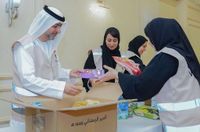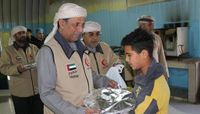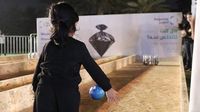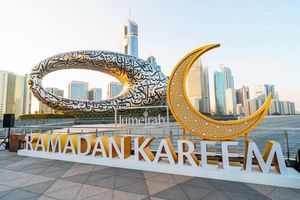During the holy month of Ramadan, humanitarian efforts have surged across the United Arab Emirates, highlighting the nation’s commitment to social responsibility and community support. Various organizations have launched initiatives aimed at assisting underprivileged families and promoting charitable activities, all while commemorating the legacy of the late Sheikh Zayed bin Sultan Al Nahyan.
The UAE-Jordanian camp administration has been particularly active, distributing Iftar meals to Syrian refugees and underprivileged families living in makeshift tents outside the camp. Saif Khalifa Al Suwaidi, Director of Emirates Relief, emphasized that this initiative is part of a broader effort to honor Sheikh Zayed’s humanitarian legacy. "Since the beginning of the holy month, we have intensified our humanitarian initiatives for the benefit of our refugee brothers in the camp and the underprivileged families in Jordan," he stated, underscoring the importance of these efforts in light of the ongoing challenges faced by these communities.
In addition to meal distributions, the camp also hosted a Ramadan sports course, which attracted a large audience of volunteers and camp residents. This event not only fostered a competitive spirit but also aimed to strengthen bonds among the camp's inhabitants. Al Suwaidi noted that the sports course has become an annual tradition, promoting physical fitness and positive interactions among the youth.
Meanwhile, the Ministry of Finance has announced four significant community initiatives during Ramadan, aligning with the "Year of the Community 2025" campaign. These initiatives include "Ramadan Al Khair for Underprivileged Families," "Supporting Humanitarian Cases," "Min Khair Zayed," and "Eidkum Aleina." Younis Haji Al Khoori, Undersecretary of the Ministry of Finance, articulated the ministry's commitment to enhancing social cohesion and supporting the most vulnerable members of society. He remarked, "These initiatives reflect our firm commitment to social responsibility and enshrine the values of giving and interdependence that are an integral part of the UAE's approach."
The Ramadan Al Khair initiative, in collaboration with the Family Care Authority and the Emirates Red Crescent Authority, saw over 50 volunteers distributing food baskets filled with essential supplies to alleviate financial burdens faced by underprivileged families. The ministry also launched the Supporting Humanitarian Cases initiative, which aims to assist those suffering from serious health conditions, ensuring they can access necessary medical treatments.
Celebrating Zayed Day for Humanitarian Work, the Ministry of Finance launched the Min Khair Zayed initiative, which provided assistance to over 1,500 individuals in need. This initiative included organizing Iftar meals, particularly for laborers, reflecting the values of charity and solidarity established by Sheikh Zayed.
Adding to the momentum of charitable activities, the "Hayat Line" initiative, organized by the Department of Islamic Affairs and Charitable Activities in Dubai, has gained notable traction. Since its inception, it has recorded over 39 million steps taken by 276 volunteers across ten residential neighborhoods. The initiative encourages individuals to convert their physical activity into charitable contributions, thereby enhancing the culture of giving in innovative ways. Mohammed Musabah Dhahi, Executive Director of the Charitable Work Sector at the department, stated, "The numbers recorded since the launch of the initiative reflect the awareness of society and its keenness to participate in charitable works in innovative ways that align with the spirit of the holy month."
Dhahi further praised the initiative's success in fostering community interaction, asserting that every step taken can lead to a better life for others. Ahmed Faisal Al Janahi, Head of Charitable Activities within the Ramadan in Dubai initiative, echoed this sentiment, emphasizing the importance of linking daily physical activity with charitable work.
As Ramadan progresses, the Department of Islamic Affairs and Charitable Activities continues its efforts to support sustainable community initiatives that embody the values of compassion and interdependence. These initiatives not only aim to meet the immediate needs of the community but also strive to instill a lasting culture of giving and charity across the UAE.
In conclusion, the spirit of Ramadan is alive and well in the UAE, with various organizations stepping up to ensure that the less fortunate are not forgotten. Through these initiatives, the country not only honors the legacy of its founding father but also reinforces its commitment to building a more cohesive and supportive society.







